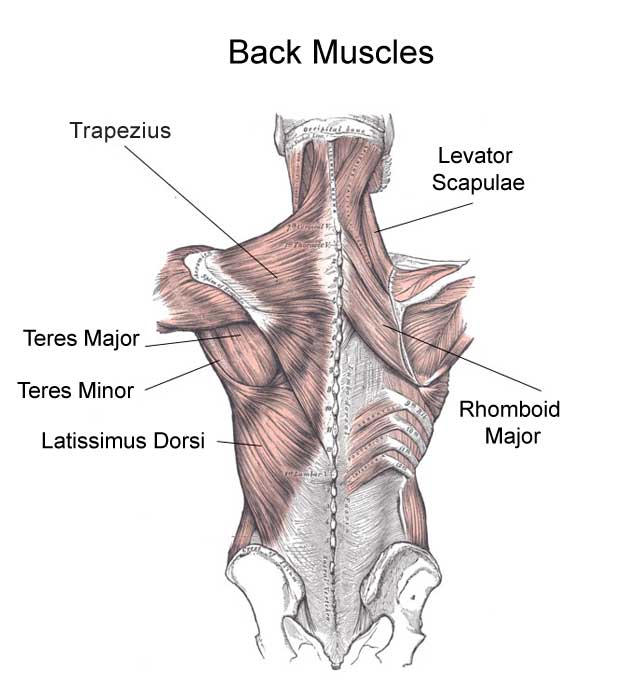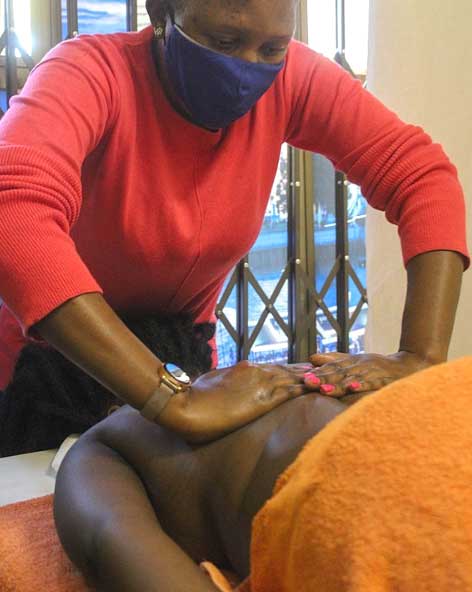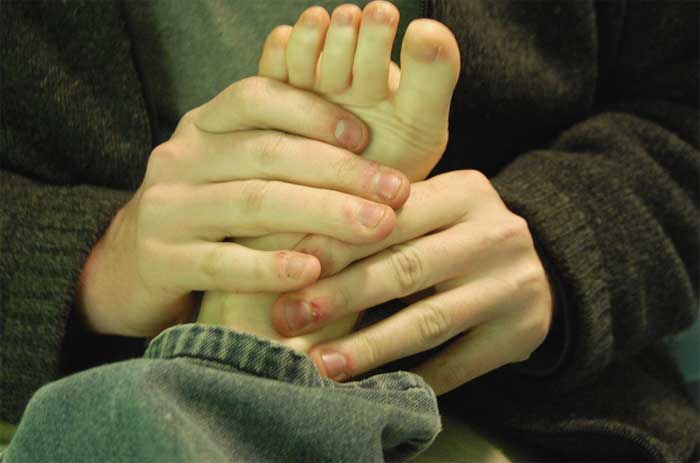Muscle pain herbs
When muscle pain gets you down, give herbs a try.
My favorite remedy for muscle pain is frankincense essential oil. Diluted with almond oil, it makes the perfect muscle rub. You can add a few drops angelica essential oil for extra strength.

There are many ways to relieve muscle pain. Massage, hot compresses, ice packs, lotions, creams, and herbal ointments are all useful.
Help for tired, sore muscles
Sometimes a warm compress can stop muscle pain. Sometimes cold feels better. Switching back and forth from hot to cold can also help both the circulatory and lymphatic systems.
Sometimes herbs like white willow bark are used for treating back pain. Aromatherapy can also help with back pain, especially when it stress related. Read on to learn all about stopping muscle pain with herbs and home remedies.

Using heat and cold on sore muscles
Basically, heat helps relax chronic muscle pain and spasms.
Cold is best for new problems, or when there is swelling.
Applying heat to new injuries or when fever is present can actually cause damage and delay healing.
Ice is always best for recent, acute injuries. Ice packs are good for injured muscles, but don't leave ice on for too long. You don't want to get frostbite.
Switching from hot to cold every few minutes is sometimes the best remedy. It will increase circulation and bring healing to the area. Read more about using heat and cold for pain at Cleveland Clinic.
Using warm compresses for chronic or mild conditions.
A heating pad is great for sore muscles, but warm, moist herbs are even better.
- Pick a favorite mild herb like mullein or comfrey and put it in a little boiling water.
- Turn off the heat.
- Once the plant material is wilted and a little mushy, dump it all on some cheese cloth or a thin, moist towel.
- Fold the towel so you don't make a mess, and put it over aching muscles while still hot (but not hot enough to burn the skin).
- The towel should be wet.
Never use hot compresses on babies, the elderly, or anyone that can't complain about the heat (the same goes for ice packs). Read more about making compresses, poultices, and herbal products here.
Angelica essential oil helps muscle pain.
Angelica essential oil is often used in massage to relieve over-worked muscles. When added to massage oils, angelica can really help.
Angelica ointments and creams also help increase circulation and blood flow, bringing more oxygen to the muscles and vital organs. This helps during sports, exercise, and when at rest, keeping muscles from getting sore in the first place.

Anise essential oil to warm the muscles
Anise essential oil makes an effective ointment that warms the body after a cold, winter day of outdoor activity. Anise is very warming and takes the chill out of your body, even on the coldest days of winter.
Arnica to stimulate healing
Arnica (Arnica montana) also makes useful ointments, creams, and massage oils for pain management. Arnica is suitable for short term use only. Do not use daily because overuse can be toxic.
Also, test arnica cream on a small area of your forearm before using on large areas of the body. It can cause rash in come cases.
Arnica can reduce pain and swelling from sprains, strains, fractures, bruises, over exertion, and sore muscles. All athletes should keep some arnica ointment on hand since it helps increase white blood cell activity and stimulates healing in soft muscle tissue.
Arnica is often used in homeopathic remedies that are formulated to treat bruising, swelling, and muscle pain.

Agrimony for sore feet
Sometimes the muscles of the feet get sore and walking becomes painful. Whether caused by exercise, standing all day, obesity, old age, or foot injury, a good herbal foot massage or foot soak can help.
Try an agrimony tea foot soak for foot pain. It feels amazing. After soaking in agrimony, rub on some good massage oil. Soon your tootsies will be ready for dancing.
Read about using herbs to relieve other types of pain.
Read about using natural remedies to relieve headache pain.
Science and delayed-onset muscle soreness
Current treatments for muscle soreness include stretching, herbs, massage, supplements, and pharmaceuticals.
Muscle soreness that occurs after exercise is considered either acute or delayed.
Acute soreness occurs during the work out or within 6 hours.
Delayed muscle soreness occurs from 6 to 48 hours after exercise.
The main symptoms of delayed muscle soreness include stiffness, tenderness, and pain when moving. There can also be swelling, decrease in range of movement, decrease in strength, and increases in specific muscle enzymes such as creatine.
Studies show that herbal remedies are just as effective as common nonsteroidal anti-inflammatory medicines.
Herbs are also cheaper, readily available, and safer, with fewer side effects.
Proven to work
Herbs that are shown to help back pain include saffron, turmeric, ginger, cinnamon, black tea, pomegranate, chamomile, watermelon, cherry, and garlic.
Studies have been done on several herbs to see how they work as pain relievers.
- St. John's Wort has sedative, analgesic, and antidepressant properties.
- Ginger is good for chronic pain due to inflammation.
- Turmeric is anti-inflammatory and suited for the treatment of rheumatoid arthritis.
- Omega-3 fatty acids seems to play a role in pain regulation by inhibiting prostaglandin levels and serotonin activity.
- Capsaicin, or chili pepper extract, is shown to help pain when applied externally. It works by causing pain receptors to quit functioning (but they regenerate in a few weeks).
- Feverfew is shown to be good for pain due to its anti-inflammatory action.
- White willow is shown to stop pain due to high levels of Salix (like aspirin), flavonoids, and polyphenols in its bark.
*Before combining herbs with over-the-counter products like aspirin, do some research!
Ginkgo, garlic, ginger, bilberry, dong quai, feverfew, ginseng, turmeric, meadowsweet, willow, chamomile, fenugreek, red clover, valerian, kava, and tamarind can affect blood platelets. These herbs should not be taken by people with bleeding disorders unless prescribed by a healthcare professional.
Arnica is usually safe when used externally but can be toxic, even fatal if more than a small amount is ingested. Do not take arnica internally and do not use it on broken skin. Keep arnica away from children and pets.
Always dilute essential oils before use with a good cold-pressed carrier oil like olive or almond oil. Always consult with your healthcare professional before using any herbal remedy or essential oil especially if pregnant, nursing, under the age of eighteen, or taking other medicines.
Sources:
https://www.ncbi.nlm.nih.gov/pmc/articles/PMC5329173/
https://www.ncbi.nlm.nih.gov/pmc/articles/PMC7918078/
Blessings to you and yours!
Thanks so much for reading my blog. Jan.

*Note - the information on this website has not been evaluated by the Food and Drug Administration.
© 2005-2024 website design and content by Janice Boling